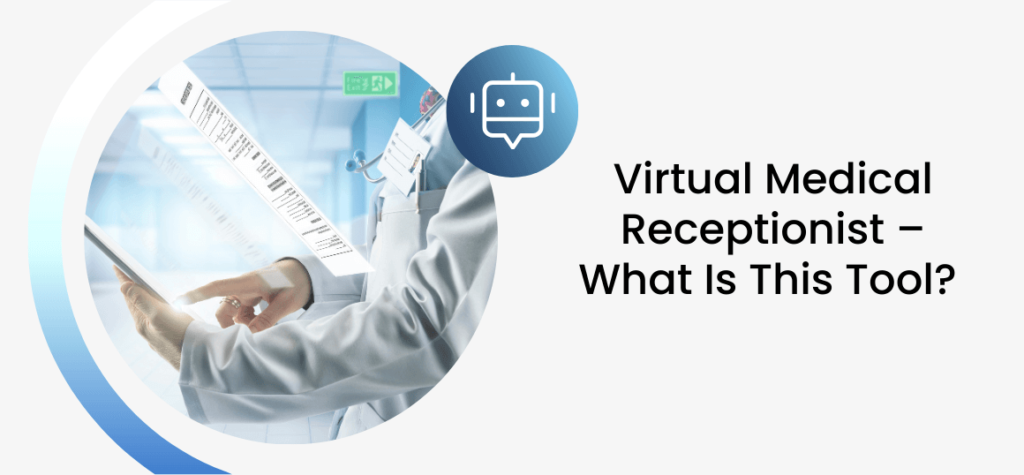Virtual Medical Receptionist – What Is This Tool?

Virtual Receptionist – What Is It and How Does It Work?
Public and private healthcare systems are evolving year by year. Medical facility managers are increasingly turning to modern technological solutions, including tools based on artificial intelligence (AI). These tools, such as virtual receptionists, are particularly effective in patient service processes. Learn what a virtual receptionist is, how it works, and the benefits it offers.
What Is a Virtual Receptionist in a Medical Facility?
In short, a virtual receptionist is a voice bot used to assist patients in medical facilities. This tool operates using artificial intelligence and a voice recognition module. The patient’s spoken words are analyzed, and the medical voicebot engages in real-time conversation to schedule doctor appointments and respond to other inquiries. This system functions as a patient registration program for clinics, allowing patients to book appointments with selected specialists. It relieves the workload of front-desk staff, as they only interact with patients when the tool cannot answer their queries. This kind of automation significantly saves time.
How Does the Virtual Receptionist Work in Patient Registration?
It’s well known that booking doctor appointments is an area where delays often occur in medical facilities. The capabilities of staff responsible for phone registration are limited. After each call, they must input patient data into a calendar or computer system, which takes extra time. As a result, patients often complain about trying to reach the clinic for hours, only to find that no appointment slots are available. Implementing a virtual receptionist automates this process, allowing medical registration staff to focus on more complex cases or patients who visit the clinic in person.
The principle behind virtual voice registration is relatively simple. The electronic patient registration system is designed to operate 24/7, meaning patients can access services at any time. The system is integrated with specialists’ calendars, enabling patients to receive real-time information about available appointments and book those that suit them. This also minimizes the risk of scheduling conflicts.
Another feature of the appointment booking program is confirming and reminding patients of their visits. Clinics can implement two-way communication via SMS. In short, this involves exchanging text messages with the patient. If a patient cannot attend their scheduled appointment and wishes to reschedule, they can do so via SMS. This frees up the appointment slot for other patients to book. This functionality is crucial for reducing “no-shows,” when patients fail to attend their scheduled appointments.
Other features offered by the virtual receptionist include:
- Updating patients’ personal information;
- Conducting interviews with patients (e.g., preliminary assessments, pre-qualification for procedures, etc.);
- Providing test results after patient authorization;
- Ordering prescriptions;
- Contacting doctors in emergency situations.
Additionally, the medical voice bot we offer integrates with the HIS system used in your medical facility, allowing for automation of many patient service processes.
Key Benefits of Using a Virtual Receptionist in Patient Service
Of course, implementing a virtual receptionist in a clinic brings numerous benefits. Integration with the HIS system helps handle most patient inquiries. The tool professionally guides callers through the appointment booking process or answers other questions. Moreover, the virtual receptionist guarantees a consistently high level of communication 24/7, meaning every patient is served equally. Unlike human staff, the AI tool does not have “bad days,” which is a significant advantage.
Implementing a virtual receptionist also saves a considerable amount of time. Automating incoming patient calls allows staff to focus on other crucial tasks, increasing their efficiency and improving the clinic’s overall functioning. The appointment confirmation feature reduces the number of missed consultations, allowing more patients to be seen. Of course, patients receive quicker responses to their inquiries, which directly enhances patient satisfaction and improves the clinic’s reputation. This applies to both public clinics and private practices.
Example Implementations by EasyCall
At EasyCall, we have been working with the medical sector for years. As a result, we understand the challenges clinics face. Our clients include both private and public facilities. We serve large clinics and specialist practices. Want to learn more? We encourage you to explore our implementations at Omega Medical Clinics and Gizińscy Medical Center in Bydgoszcz. Contact our expert, who will introduce you to the potential of implementing a virtual receptionist in your facility and guide you through the entire process.
